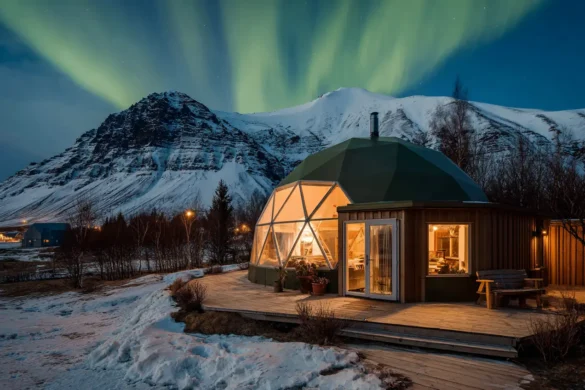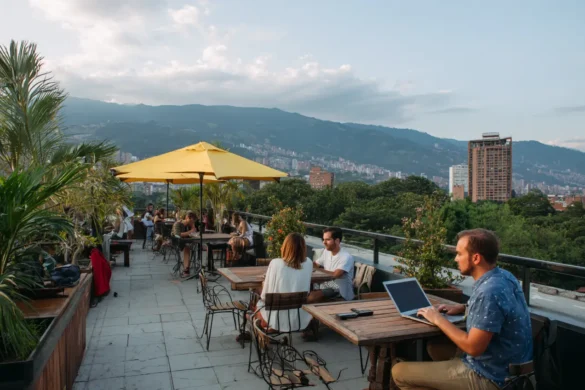Africa is a continent of endless possibilities. From cutting-edge cities to laid-back coastal hubs and breathtaking landscapes, it’s home to some of the most exciting and livable places on the planet. But with 54 countries and thousands of cities and towns, choosing the best place to live isn’t just about beauty…it’s about lifestyle, opportunities, and overall quality of life.
I’ve traveled across Africa and, for this guide, I went beyond personal experience. I dug into the data to find the best places to live based on key factors that impact everyday life. Here’s what I considered:
✅ Cost of Living – Housing affordability, utilities, and general expenses
✅ Job Market & Economy – Employment opportunities and business growth
✅ Safety & Stability – Crime rates, political stability, and security reports
✅ Quality of Infrastructure – Roads, public transport, electricity, and internet access
✅ Education & Healthcare – School quality, hospitals, and overall well-being
✅ Lifestyle & Leisure – Entertainment, dining, nightlife, and cultural scene
✅ Climate & Natural Beauty – Weather, pollution levels, and access to nature
Whether you’re looking for a cosmopolitan city, a beachfront paradise, a tech hub, or a peaceful escape with modern amenities, these 12 destinations stand out as the best places to live in Africa in 2025. So let’s fly to Africa and dive into each of these places in more depth!
The Best Places to Live in Africa
Searching for your ideal home in Africa? With its varied climates, living standards, and unique landscapes, here are some top destinations at a high level:
- Best for community and tradition: Accra
- Best for history and culture: Cairo
- Best for coastal living: Cape Town
- Best for business opportunities: Casablanca
- Best for music and arts: Dakar
- Best for outdoor activities: Durban
- Best for vibrant city life: Johannesburg
- Best for expatriates: Marrakech
- Best for modern amenities: Nairobi
- Best for Mediterranean lifestyle: Tunis
Below are the top places to live in Africa that you ought to consider.

1. Live in Accra, Ghana’s tech hub
Accra is honestly one of the best places to build a life in Africa right now. The energy is just incredible – it’s got this perfect blend of modern convenience and authentic African culture that you can’t find anywhere else. The tech scene is absolutely booming, with co-working spaces like iSpace and Impact Hub packed with entrepreneurs and digital nomads from all over the world.
Housing costs around $400-800 for a decent one-bedroom in areas like Osu or East Legon, which isn’t cheap by African standards but totally manageable if you’re earning in dollars or working remotely. I paid about $650 for a furnished apartment in Labone that was walking distance to the beach. The infrastructure keeps getting better too – reliable internet, decent roads, and Labadi Beach is perfect for weekend unwinding.
What really sold me on Accra was the food scene and nightlife. You’ve got everything from amazing street food for under $2 to upscale rooftop bars in Osu where a cocktail costs $8. The people are incredibly welcoming, and English is widely spoken, so you don’t feel like an outsider. Plus, it’s politically stable and the economy is growing fast. If you’re looking for opportunity mixed with that laid-back coastal vibe, Accra delivers big time.
- Read next: Most Beautiful Places to Visit in Ghana

2. Experience Cairo, Egypt’s ancient capital
Cairo is an absolute steal if you want to live somewhere with 5,000 years of history right outside your door. Honestly, the affordability blew my mind – you can rent a nice one-bedroom in Maadi (where most expats live) for around $300-500 per month, and a decent meal costs maybe $3-5.
The job market is actually pretty solid, especially if you’re in tech, finance, or teaching English. I met tons of remote workers at places like The Greek Campus co-working space who were living like kings on Western salaries. A Careem ride across the city costs less than $2, and the metro system works well once you figure it out. The Grand Egyptian Museum just opened near the Pyramids, and it’s honestly mind-blowing.
Living here isn’t without challenges – traffic is insane, and you’ll need to learn some basic Arabic to really connect with locals. But the Nile Corniche walks at sunset, weekend trips to Alexandria, and having the Pyramids of Giza as your backyard more than make up for it. I genuinely felt like I was living inside a history book, and my monthly expenses barely hit $800 including rent. For history lovers on a budget, Cairo is unbeatable.
- Read next: Most Beautiful Places to Visit in Egypt

3. Call Cape Town your coastal paradise
Cape Town is drop-dead gorgeous, but it’ll cost you more than most African cities. While a decent one-bedroom in Green Point or Camps Bay runs R15,000-25,000 per month ($800-1,300), the lifestyle is worth every rand. You’re literally living between mountains and ocean – I hike Table Mountain on weekends and surf at Muizenberg after work.
The job market is strongest in tech and finance, with loads of startups around Woodstock and the V&A Waterfront. Remote work is huge here too, and co-working spaces like Workshop17 are full of international digital nomads. A car is pretty essential since public transport is limited, but you can find decent used vehicles for R100,000-150,000 ($5,500-8,000).
The food scene is incredible – world-class wine for $3 a bottle, amazing restaurants in Bree Street, and the Cape Winelands are just 45 minutes away. Safety does vary by area, so do your research, but places like Camps Bay and Constantia feel totally secure. I honestly can’t imagine living anywhere else now – it’s like having the best of California and Europe at African prices.
✈️ My #1 Hack for Cheap 2026 Flights:
It’s January, so flight prices are climbing fast—but you don't have to pay them. I’m currently seeing roundtrips to Europe for under $300 (deals you won’t find on Google Flights).
Step 1: Join Going.com's Free Plan here. It takes 10 seconds and requires no credit card.
Step 2: If you're doing a big trip this year, grab the 14-day free trial of Premium. You can even use my code JON25 for 25% off.
Seriously, this is the single best money-saving tool I’ve used in 8+ years.
👉 Send me cheap 2026 flights
4. Build your business in Casablanca, Morocco
Casablanca is Morocco’s business powerhouse, and if you’re looking to build something in North Africa, this is your launching pad. The professional opportunities are legit – it’s the financial center for the entire region. French is essential in business settings, but English is becoming more common in international companies.
Housing in expat areas like Anfa and Ain Diab costs around 3,000-6,000 MAD ($300-600) for a nice one-bedroom, which is pricier than other Moroccan cities but still reasonable. The beachfront neighborhoods are gorgeous, and you’re close to both the Hassan II Mosque and modern shopping centers. I know people who have lived in Maarif for half the cost and loved the urban, trendy vibe.
The networking scene is surprisingly strong – I met startup founders, international traders, and NGO workers at events almost every week. Transportation is decent with trams and taxis, though I recommend buying a used car for weekend trips to Marrakech or Rabat. The Atlantic coastline is stunning, and having both modern amenities and traditional Moroccan culture makes Casablanca feel like you’re living in two worlds at once.

5. Immerse yourself in Dakar, Senegal’s cultural heart
Dakar pulses with this incredible energy that you feel the moment you step off the plane. The music and art scene is absolutely off the charts – there’s live music somewhere every night, and the street art is world-class. This is where you come if you want to experience authentic West African culture without compromising on modern conveniences.
The cost of living is pretty reasonable – you can find a decent place in Plateau or Point E for around $400-700 per month, and local food costs almost nothing. I ate amazing thieboudienne (fish and rice) for $2 regularly, and fresh seafood from the harbor is incredible. The Atlantic beaches are perfect for surfing, and Goree Island is just a ferry ride away.
What really sets Dakar apart is how welcoming everyone is to foreigners. French is essential here, so brush up before you come. The business scene is growing, especially in telecoms and banking, and there’s a surprising number of international organizations with offices here. I left Dakar with a completely different perspective on West Africa and some of the best friends I’ve ever made.
- Read next: Scenic Places to Visit in Senegal

6. Enjoy Durban’s beachside lifestyle
Durban is seriously underrated as a place to live – it’s got this amazing laid-back coastal vibe that makes you forget all your stress. I worked remotely here, and every day felt like vacation with the warm Indian Ocean right there and the Golden Mile beachfront perfect for morning runs. The curry scene is insane too – some of the best Indian food I’ve ever had outside of India.
Housing is more affordable than Cape Town – I have a friend who paid R12,000 ($650) for a two-bedroom flat in Berea with ocean views. The weather is consistently warm, and you’re close to both the Drakensberg Mountains and Hluhluwe Game Reserve. The cultural mix is fascinating – Zulu, Indian, and colonial influences create this unique atmosphere you won’t find anywhere else.
The job market isn’t as strong as Johannesburg or Cape Town, but if you can work remotely or find something in tourism, you’re golden. The nightlife in Florida Road is lively, and weekend trips to the Valley of a Thousand Hills are incredible. I honestly think Durban offers the best quality of life in South Africa if you prioritize beaches, weather, and a relaxed pace over career opportunities.
- Read next: Stunning Cities to Move to in South Africa

7. Hustle in Johannesburg, South Africa’s economic engine
Johannesburg is where you come to make things happen in South Africa. And let me tell you: the business energy is electric – this is the economic heart of the continent, and you feel it everywhere. The job opportunities in finance, mining, and tech are unmatched anywhere else in Africa, and networking events happen constantly in Sandton and Rosebank.
Housing costs vary wildly depending on where you live. One of my friends paid R18,000 ($950) for a two-bedroom in Melville, but you could easily spend R30,000+ in Sandton or find something decent for R10,000 in areas like Randburg. Safety is a real consideration – I recommend living in a security complex and avoiding certain areas at night. But millions of people live here safely with common sense precautions.
The cultural scene is incredible. Maboneng has amazing restaurants and galleries, Soweto tours are mind-blowing, and the Cradle of Humankind is right outside the city. Food costs are reasonable, and a night out in Parkhurst or Greenside won’t break the bank. It’s not the prettiest city, but if you want to build a career in Africa, Joburg is where it happens. The opportunities here are just on another level.

8. Thrive in Nairobi, Kenya’s tech capital
Nairobi is absolutely buzzing right now – this is Silicon Savannah, and the startup energy is infectious. Trust me, the opportunities in tech, finance, and NGO work are incredible. It’s also the gateway to East Africa, so business travelers are constantly coming through, creating networking opportunities everywhere.
One of my friends live in Kilimani and pay around $700 for a modern one-bedroom with great security. Areas like Westlands and Karen are pricier but offer that expat bubble lifestyle. The infrastructure has improved dramatically – fiber internet is reliable, Uber works everywhere, and the SGR train to Mombasa is actually pretty nice. Having Nairobi National Park 20 minutes from the city center still blows my mind.
The food scene is diverse and affordable. Amazing Ethiopian food in Eastleigh, great Indian restaurants in Westlands, and nyama choma (grilled meat) everywhere. Weekend trips to Maasai Mara or the coast are easy and relatively cheap. Sure, traffic is brutal and you need to be security-conscious, but the energy of this city is addictive. I genuinely feel like I’m watching the future of Africa being built here.
- Read next: Most Beautiful Places to Visit in Kenya

9. Get lost in Marrakech, Morocco’s imperial city
Marrakech is pure magic – there’s just no other way to describe it. Walking through the Medina still gives me chills every single day. This place is perfect if you want to completely immerse yourself in North African culture while still having access to modern amenities in Gueliz and Hivernage.
I rented a gorgeous riad in the Medina for about 5,000 MAD ($500) per month, though modern apartments in Gueliz go for 6,000-8,000 MAD ($600-800). The cost of living is incredibly reasonable – I eat amazing tagines for $3, and even upscale restaurants rarely cost more than $25 per person. The souks are sensory overload in the best way possible, and haggling becomes second nature.
The expat community is surprisingly large and welcoming – lots of French retirees, digital nomads, and people running hospitality businesses. Getting to the Atlas Mountains takes an hour, and weekend trips to Essaouira or Fes are easy. The pace of life is different here – more relaxed, more focused on relationships and experiences than rushing around. It’s not for everyone, but if you want an adventure that changes how you see the world, Marrakech delivers.
- Read next: Magical Destinations to Visit in Africa
- You may also like: Most Magical Riads in Marrakech
- For more reading: Incredible Restaurants in Marrakech

10. Discover Tunis, Tunisia’s Mediterranean gem
Tunis flies completely under the radar, which is honestly perfect because it means you get authentic Mediterranean-Arab culture without tourist crowds. The blend of French colonial architecture with traditional medinas creates this incredibly unique atmosphere. It’s like living in a beautiful, less touristy version of Morocco.
Housing is remarkably affordable – I paid around 800 TND ($250) for a nice apartment in Lafayette near the city center. The French influence means excellent coffee culture, amazing pastries, and a dining scene that rivals anything in Europe. The Bardo Museum has world-class Roman mosaics, and Carthage ruins are just a train ride away.
What I loved most was how educated and progressive the population is – University of Tunis creates this intellectual energy, and people are incredibly well-read and interested in global affairs. The coastline is gorgeous, with Sidi Bou Said‘s blue and white buildings looking like something out of Greece. It’s not as developed as Morocco or Egypt, but that’s part of the charm. Tunis offers a sophisticated, affordable lifestyle that most people don’t even know exists.
- Read next: Most Beautiful Places to Visit in Tunisia



Global Viewpoint is a personal blog. All content is for informational and entertainment purposes only and does not constitute professional financial, medical, or legal advice.





